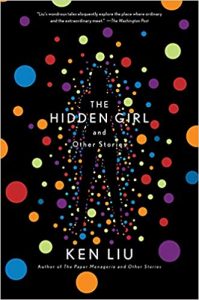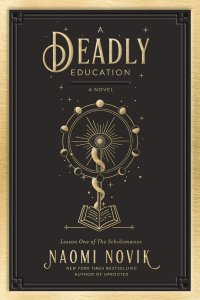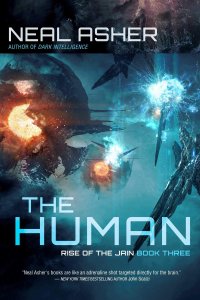Gary K. Wolfe Reviews The Hidden Girl and Other Stories by Ken Liu
 The Hidden Girl and Other Stories, Ken Liu (Saga 978-1-9821-3403-7, $26.00, 432pp, hc) February 2020.
The Hidden Girl and Other Stories, Ken Liu (Saga 978-1-9821-3403-7, $26.00, 432pp, hc) February 2020.
In his introduction to The Hidden Girl and Other Stories, Ken Liu’s much-anticipated second collection, Liu tells us that selecting the stories was easier, since he no longer felt “the pressure to ‘present,”‘ but rather decided to “stick with stories that most pleased myself.” In fact, more than half of the 18 stories (plus an excerpt from the forthcoming third volume of his Dandelion Dynasty novels) are old enough that they might have been included in The Paper Menagerie and Other Stories back in 2016; the oldest date to 2011. This is one reason that second or third story collections are often more revealing than first collections; rather than showing us “this is what I can do,” they show “this is what I’m interested in.” In no sense do any of the stories here feel like leftovers from that first collection, although a couple seem a bit fragmentary, like the Borgesian parable “Cutting” – in which a group of monks annually cut out more words from their holy book as offerings to the gods, a kind of clever inversion of Clarke’s “The Nine Billion Names of God”. What most of the stories reveal, however, is what Liu seems to be thinking about the past few years – and a few clear themes emerge. One, which isn’t too surprising given Liu’s background in computers, is the notion of the digital singularity, the now-familiar SF trope of uploading consciousness. But if that suggests the hard-SF side of Liu’s imagination, what emerges as an abiding concern of his humanist side is even more interesting: the problems, pitfalls, and rewards of child-parent relationships, which figure in fully half the stories here, as they did in his most celebrated story, “The Paper Menagerie”. Those same relationships often reveal a third theme: balancing dual identities, such as a British-educated student returning to his Chinese family in Hong Kong, or a parent who is also a distributed web intelligence, or a child learning to be a parent to a mother suffer ing dementia.
Perhaps not surprisingly, these themes converge in a number of stories, which together form a kind of meta-narrative of the singularity, which Liu treats as a mass migration into cyberspace. Liu’s singularity has some draconian rules: in order to upload, the living brain has to be scanned, but the procedure leaves the brain a “bloody, pulpy mess.” In other words, and not unlike in many religious beliefs, the geek rapture (to borrow a term already masticated into baby bird food) only works if your body dies, or at least your brain. In Liu’s more or less consistent chronology, one of the first to undergo such a procedure is a brilliant computer scientist in “The Gods Will Not Be Chained”, one of three connected stories originally published in John Joseph Adams & Hugh Howie’s Apocalypse Triptych anthologies. The narrator of the story is his daughter Maddie, who discovers a mysterious web presence – speaking entirely in emojis – that helps her deal with online bullying. The story maintains a fine balance between the account of a grieving and unhappy girl coming to terms with her parents and the cyber-thriller of what really happened to her father and why. The immediate sequel, “The Gods Will Not be Slain”, retains Maddie’s appealing narrative voice but moves into Colossus/Terminator territory as her dad battles against other uploaded consciousnesses, or “gods,” who have concluded that helping humanity destroy itself by taking control of weapons systems would be a dandy payback. By the third installment, “The Gods Have Not Died in Vain”, Maddie’s home life is more focused on dealing with her overworked mom, but now she meets a virtual sister she names Mist – a native of the uploaded world, created by her father – and the two of them form a bond even as Mist raises the argument that a post-scarcity paradise can be achieved only as people are willing to give up their physical bodies to enter the now rapidly growing cybercommunity. None of these arguments are particularly original with Liu, nor is the assumption that gender identities and family relationships will somehow persist in a nonbiological environment, but the sympathetic focus on Maddie, as she comes to terms with radical changes in her life and future, keeps the tale from turning into programmatic spec-fic.
By the time of “Staying Behind”, the rapture term “left behind” is invoked to describe those who resist uploading, even as the physical world grows depopulated and increasingly primitive and violent. The parents here cynically refer to the uploaded as “the dead” and have convinced their kids that the singularity is a “false promise,” but when the mother begins dying from a long illness, the desperate father has her uploaded against her fervent wishes, leaving the children to face a dilemma when the mother emails them that “I was wrong” and claims the digital world leaves her “ecstatic” – another loaded quasi-religious term. Still later, in “Altogether Elsewhere, Vast Herds of Reindeer” (interestingly, a title taken from the same Auden poem that gave us Catherynne Valente’s “Silently and Very Fast”), most kids are virtual-world natives, living in multidimensional constructs. The mother of the narrator, one of the few remaining “ancients” who lived part of her life in flesh, worries that humanity has “turned inward and become complacent,” as she tries to persuade her daughter to join her in exploring the physical universe by having herself beamed to a robot sent to a distant planet. The timescale shifts more radically in “Seven Birthdays”, a kind of formal experiment in which Liu forces himself into ever more remote futures by the simple trick of having each of the birthdays a multiple by seven of the previous one – so that it begins with the young-girl narrator’s seventh birthday, then jumps to 49, to 343, and so on until we’re well past a million years in the future. It’s the sort of device used before in stories like Jonathan Lethem’s “Five Fucks” or Sean Williams’s “All the Wrong Places”, but as usual Liu casts it as a family drama: the overworked mom nearly misses Mia’s seventh birthday, and by the time Mia turns 49, she herself is so busy – working on the problem of scanning brains – that the roles are reversed, with the now elderly mother suffering from dementia. By her 343rd birthday, the focus shifts to Mia’s relations with her own daughter, both now living in virtuality. The parental problems move to the background a bit in subsequent jumps into deep time, but the tale ends with a somewhat contrived but nonetheless moving full-circle conclusion.
Family dynamics aren’t confined to Liu’s singularity tales, however. Other familiar SF tropes are also invoked in service of exploring parent/child relations. A mother given only two years to live realizes that the time dilation of repeated space journeys will enable her to see her daughter grow up – and even grow old – in the brief but elegant “Memories of My Mother”, while an enigmatic alien structure on a distant planet brings together an alienated father and daughter in “The Message”, a story which in many ways inverts and critiques Godwin’s “The Cold Equations”, though it’s nearly as front-loaded as that chestnut. One of the most complex and provocative tales is the lead story, “Ghost Days”, in which an ancient Chinese spade-shaped bubi coin passes from a British-educated Chinese student in 1905 Hong Kong who is facing cultural tensions with his father, to a Chinese-American student confronting racism in Reagan-era Connecticut, and finally to a genetically engineered posthuman student on a remote planet in the 24th century. Each is confronted with the conundrum of living in two worlds, symbolized by the bubi, and Liu’s ingeniously layered structure only adds to the resonance between the different time frames. The question of dual identity is made even more explicit in the one story involving aliens, “The Reborn”, depicting a problematical kind of symbiosis that in some ways reflects the debate over embodiment vs. uploading in those other stories.
As should be evident by now, Liu is fond of narrative packets – tales whose segments jump forward or backward in time or shift viewpoints–covering thousands of millennia in the case of “Seven Birthdays”– and this can be equally effective when the time frames are more intimate – as in “Maxwell’s Demon”. The collection’s most direct indictment of racism, it describes the fate of a young Japanese American physicist interned at the Tule Lake concentration camp in 1943, first classified as a “no-no girl,” then sent as a scientific spy to Japan. Because of her apparent affinity with spirits, she finds herself attached to a paranormal research unit which assigns her to train the spirits to act as a literal Maxwell’s demon in order to create a superweapon. Despite its odd mix of supernaturalism and classic physics, the story’s bitterly ironic ending, which moves forward to 1945, is powerful. Equally powerful, but in a very different and disturbing way, is “Thoughts and Prayers”, which shifts among the viewpoints of family members of a young woman killed in a mass shooting, as they helplessly watch internet trolls cruelly manipulate images from her memorial video into porn videos. The memorial video itself is produced using algorithms which feature much more prominently in “Real Artists”, a rather slight satirical piece about the film industry’s growing obsession with audience research.
As those last two stories suggest, an abiding concern of Liu’s is how technologies that are already with us may be used or misused in the near future. “Byzantine Empathy” is not only the most provocative story I’ve read concerning the possible uses of blockchain technology, but one of the clearest explanations of blockchain itself (not surprising that it originally appeared in the MIT anthology Twelve Tomorrows). After opening with a genuinely disturbing VR scene of Myanmar refugees being brutalized by soldiers, though, it develops into what amounts to a policy debate between two former college roommates over the relative benefits of a new VR-based blockchain called Empathium – which radically decentralizes fundraising for worthy causes – compared to more traditional charity organizations. (The title comes from a parable about Byzantine generals needing secure communications lines.) Despite the sympathetic portraits of its two main characters, the story can’t help but turn into a fairly abstruse debate about resource allocation. By contrast, Liu’s treatment of another hot-button issue, global warming, is given the unwieldy title “Dispatches from the Cradle: The Hermit – Forty-Eight Hours in the Sea of Massachusetts” and is set in a more distant 27th century, when (somewhat as in Kim Stanley Robinson’s 2312) terraforming efforts are underway to make Earth once again habitable. Much of the action is set in a sunken Boston, hauntingly evoked in a way which recalls Robinson’s “Venice Drowned”.
Given Liu’s success with his epic Dandelion Dynasty fantasy novels, it’s interesting that only three of the selections here approach fantasy, and one of those is a brief preview of The Veiled Throne, the forthcoming third volume in that series (which is fun, but I’ll refrain from commenting until the novel shows up). Each of the two other fantasy tales seems ready to open up into broader narratives. The title story, “The Hidden Girl”, is set in Tang Dynasty China, where a young girl is abducted by a bhikkhuni, or Buddhist nun, who trains her as an acrobatically skilled assassin. But on her first assignment, her encounter with the targeted warlord and his son causes her to re-evaluate her training, placing her at odds with her sister assassins and setting her on her own course to “protect the innocent and guard the timid.” It’s basically a superhero origin story, and it’s not surprising that Hollywood optioned it a few years ago. “Grey Rabbit, Crimson Mare, Coal Leopard”, the only story original to the collection, also concludes with a suggestion of further adventures. In a repressive sort of steampunk dystopia, Ava works as a miner sifting through the middens of an ancient technological civilization destroyed by an apocalyptic Plague. One of the few avenues for the repressed miners to gain social status is to partake of Revelation wine, a magical potion which “allowed its drinkers to reshape their body into a second form, a form that displayed their latent talents and hidden abilities.” Ava’s transformation simply turns her into a rabbit. Those rabbit skills prove useful in unexpected ways as she rescues a mare (the revealed shape of another woman) and the two of them join forces with a poacher who takes the form of the coal leopard. With the three women learning how their individual powers can work together, the story seems to set the stage for an epic revolution yet to come. Perhaps this sort of adventure – which, as we know from the Dandelion Dynasty, Liu can write with the best of them – liberates him from the conscientiousness and tech-savvy explanations that sometimes clog the movement of his SF tales, even while deepening their power. Liu’s fantasies may be more freewheeling than his SF, but The Hidden Girl and Other Stories leaves us wanting a lot more of both.
Gary K. Wolfe is Emeritus Professor of Humanities at Roosevelt University and a reviewer for Locus magazine since 1991. His reviews have been collected in Soundings (BSFA Award 2006; Hugo nominee), Bearings (Hugo nominee 2011), and Sightings (2011), and his Evaporating Genres: Essays on Fantastic Literature (Wesleyan) received the Locus Award in 2012. Earlier books include The Known and the Unknown: The Iconography of Science Fiction (Eaton Award, 1981), Harlan Ellison: The Edge of Forever (with Ellen Weil, 2002), and David Lindsay (1982). For the Library of America, he edited American Science Fiction: Nine Classic Novels of the 1950s in 2012, with a similar set for the 1960s forthcoming. He has received the Pilgrim Award from the Science Fiction Research Association, the Distinguished Scholarship Award from the International Association for the Fantastic in the Arts, and a Special World Fantasy Award for criticism. His 24-lecture series How Great Science Fiction Works appeared from The Great Courses in 2016. He has received six Hugo nominations, two for his reviews collections and four for The Coode Street Podcast, which he has co-hosted with Jonathan Strahan for more than 300 episodes. He lives in Chicago.
This review and more like it in the February 2020 issue of Locus.
 While you are here, please take a moment to support Locus with a one-time or recurring donation. We rely on reader donations to keep the magazine and site going, and would like to keep the site paywall free, but WE NEED YOUR FINANCIAL SUPPORT to continue quality coverage of the science fiction and fantasy field.
While you are here, please take a moment to support Locus with a one-time or recurring donation. We rely on reader donations to keep the magazine and site going, and would like to keep the site paywall free, but WE NEED YOUR FINANCIAL SUPPORT to continue quality coverage of the science fiction and fantasy field.







